Echo Chronicles: The Uses of Glory
by SealWyf, HSM team writer
I’ve considered it often during the year-and-change that I’ve been Homeling: what makes the Collective a success? Because success it is — ancient by Home standards (from the early days of Closed Beta), it has an active membership in the hundreds, a fact I realize painfully each time I adjust my Friend List. In a world where clubs flare and die like windblown matches, the Homeling Collective is a constant star.
On several occasions over the years, the Collective has been wracked by drama and mass defection. But each time it rebounds, larger and more vigorous than ever. We recently added our 28th Mother Ship clubhouse. Our events can max out public spaces. How in Home do we do it?
One factor is our distinctive appearance: the Homeling dress code and avatar modifications, which I described in an earlier HomeStation article, “Dressing the Collective.” We are one of the most recognizable social clubs in Home, as visually unique in our way as the hamster-headed clans.
Another key to our success is organization: a well-structured officer corps, a vibrant group website, and frequent organizational meetings. At the heart of the Collective is a core of hard-working, intelligent and creative individuals concentrated in (but not limited to) the Generals’ Council.
But being well-dressed and well-organized wouldn’t cut much ice if we didn’t attract attention. So it’s the third factor of Homeling success that I describe in this article: the distinctive Homeling habit of public spectacle. Or, as we say, Glory.
If you see a Homeling in Home, he is probably in a group. This is not because Homelings hate to be alone; it’s because lone Collective members are usually wearing their human avatars. Or, if they are in Homeling form, they will probably soon be joined by other beings eager for a party.
Homelings accumulate. We like being in groups because groups contain our friends. Groups also attract attention from the surrounding humans. Attention leads to recruitment, and new Homeling members. And new members are what keeps the Collective large and vibrant. It’s “win” right down the line.
A group of Echochrome-clad Homelings is automatically a spectacle. But we make ourselves more spectacular by standing in formations. A group of Homelings in a public space will (with some encouragement from officers) spontaneously form lines and circles. If there is a linear feature in the area, we will stand along it. If there is a circular feature, we’ll surround it. If someone drops a Bubble Machine, we’ll surround that, and start a Klenting Circle.
The Line Formation is the most basic — so basic it’s also called the Homeling Formation. But there are variations for special occasions: Fluidic Crescents, Fluidic Crosses, and the surreal Homeling Beast, a heap of sitting Homelings glitch-merged into a multi-headed monster.
There are also circle formations — facing inward or outward, dancing or standing at attention, with or without a cloud of drifting bubbles.
A special form is a circle of Rave Dancers surrounding one or more Bubble Machines. This is the Klent circle, described in my earlier article, “Klenting the Night Away.” It’s one of our most successful formations for attracting curious humans, who seem drawn to Bubble Machines like moths to porch lights. Many stay long enough to start a conversation. And some of these find us interesting, and are Assimilated.
We also have a mobile spectacle – the Dramatic Walk. In this activity, a group of Homelings walks slowly around a public space. It’s human instinct to follow a parade, or at least ask what it’s about. By the time we get to our destination, such as the dance stage in Central Plaza, we may have added a trailing group of curious human followers. If not, we’ll probably attract them once we start standing in formations, or dancing.
To be honest, not all the attention we attract is positive. For each person who is intrigued by the white-clad aliens, there are others who are hostile. This is not simple xenophobia. If hostility were caused by unusual costumes, half the avatars in Home would be trolled. There is something about our self-presentation, our Glory itself, that wakes fear and suspicion. Having been on both sides of the spectacle – and having watched my best friend leave the Collective because our culture made him uncomfortable – I can put a name to it:
Sometimes we look like a cult.
I’ll go further, and say that sometimes Glory edges toward the creepy, “dystopic” side of the Homeling aesthetic. I explored this in some depth in my article “Becoming Gertrude Stein: Producing the Homeling Art Shows.” It was my unease with Glory and its fallout that led me to find ways to promote the creative, playful side of Homeling culture. Which is equally real, though not always as obvious to non-members.
Still, when my best friend left the Collective, I wobbled. Was I deluding myself in maintaining we were merely a role-playing social club with delusions of alien-itude? I spent some months trying to balance my warring instincts, living on both sides of the debate.
But, in the end, the Homelings won. Because, beneath it all, they felt familiar. Because, one night, as we Dramatic Walked around the Saucer Pop pond, I had a simultaneous, dream-like memory of walking slowly and dramatically into a high school gymnasium, wearing a brown cotton robe draped with swaying strings of beads, as a drum beat with the rhythm of a heart.
And the memory connected. Of course. That’s why this all felt familiar. I had been a Camp Fire Girl.
Camp Fire USA was founded in the early 20th century as a girls’ club. It still exists as a co-ed group. I have no idea what their current culture and traditions are. But when I was a member, in the decades we Baby Boomers call home, their everyday activities were those of any Southern California middle-class girls’ club: crafts and cooking, hikes and camping trips, days at the beach, tours of museums and theme parks and television studios. Simple fun with friends, in other words. Nothing exotic.
But every few months, we had another life: a spiritual, ceremonial one in which we role-played American Indians.
Of course we were not imitating real Native Americans, or even trying to. We were as authentic as Princess Tiger Lily’s tribe in Peter Pan. We were a tribe of pre-adolescent girls who inhabited a world of ceremonial gatherings held in summer camps and borrowed school gymnasia. At the center of each ceremony was a fire — a real one outdoors, an imitation or symbolic one in places where fire marshalls ruled.
Our dress was not Echochrome, but cotton gowns decorated with wooden beads, each symbolising some small act of creation or service. The beads and other awards were a sacrament (a concept I gleaned from my early church instruction), “the outward and visible sign of an inward and spiritual grace.” A glance at any ceremonial gown, and the number and color of its ornaments, gave you a very good idea of the character of its owner. These ornaments were awarded – at least in part – at the periodic ceremonials, which were spectacles of an idealized generic, nature-based spirituality.
It was a culture that appealed to the naivité of the Fifties, the idealism of the Sixties and the emotional intensity of childhood. We participated with a fervor that belied the outward silliness of little girls playing Indian. We were not there to show off our achievements, or not only that. Each ceremonial was also a bonding. A act of sisterhood, based on simple ideals of spirituality, creation, service and upright character. Not a bad set of ideals for a child on the edge of adulthood. Not a bad set of ideals for anyone, really.
It’s an experience that formed me, in ways I’m still discovering. Having been a suburban pre-teen Indian maiden was one of the reasons I totally “got” Homelings the first time I encountered them on Irem Beach. Because Homelings are, at heart, also about simple ideals: respect for all, fun, and friendship in our shared virtual world. Like all simple ideals, they can be devilishly hard to live up to. Being Homeling, in the deepest sense of the word, is a constant challenge.
The girls in that gymnasium knew they were not Indian maidens. And Homelings know they are not cosmic emissaries from another universe. But, for the duration of our spectacles, we become them, as an actor puts on a character. It’s fun. But it’s more than that.
On the night I was promoted to General, I was asked to lead a Dramatic Walk around Central Plaza. I stepped out in my new black formal uniform, with glowing green eyes and and a flaring green sword. The rest of the Collective fell in behind me.
In the world of Home, I led my friends around the Saucer Pop pond. “Follow me,” I texted. “Follow me,” they echoed. And then, “Follow her.” And as we walked, I seemed to hear the echo of a drum with the beat of a human heart.
In a darkened room, the being who held the controller began to sing:
We come, we come to our Council Fire
With measured tread and slow…
And, in the shadowy halls of memory, a line of solemn girls with braided hair and swaying beads walked through the gymnasium to the heartbeat of the drum, to take their places around a crepe-paper fire illuminated by a flashlight. Which, for that moment, became beautifully, deeply real.
Glory can be suspect. I know that. It can be used by the evil and unscrupulous, to overawe and coerce the human spirit. That kind of Glory deserves to be loathed.
But Homeling glory is not scary, or it need not be so. It is fun, and it attracts attention. It is spectacular for its own sake. It looks terrific in screen shots and in videos.
But it is more than that.
For ceremony is also an act of bonding. It is how we declare our brotherhood on Home. It is the outward and visible sign of our shared ideals, our friendship, and our mutual respect.


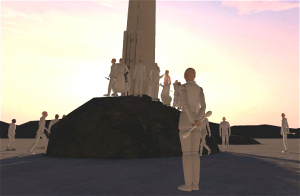
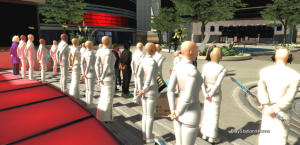
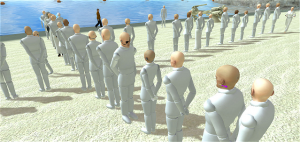
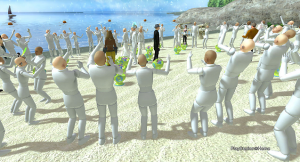
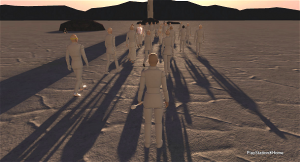
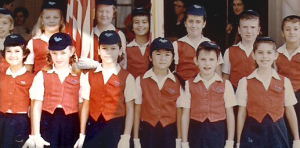
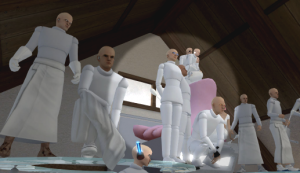
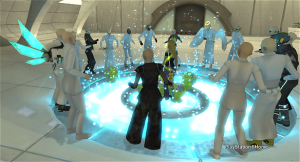
Awesome article General Seal,way to continue to tell educate people about a great organization of folks just wanting to have fun with no drama..Kudos…
Words are important. They carry their histories with them. Calling two things by the same name makes them seem the same. Conversely, calling two things by different names makes them seem, well, different. Or at least emphasizes the differences between them.
So it matters to us whether people call us “cult” or “fam” or “club” or “group”, or our chosen description, “collective”. Each word carries its own weight of emotional baggage, its own implications.
I wouldn’t mind calling all Home groups “groups”, but it does lose some emotional resonance, like calling all people “individuals”. What kind of group are we? We consider ourselves a “collective”. “Fam” has gotten a bad rap in Home because of the kind of people who adopt it. A “fam” implies power, guarding territory, and a strict hierarchy of rank. “Collective” implies a more egalitarian structure. I think it describes us better.
Which may sound odd coming from a Homeling General, but the rank carries no particular power other than the right to wear smexy black outfits and participate in certain confidential discussions. I can’t boss anyone around. My Subcommander in Training still teases me in public about how hard she works starching my socks.
Maybe that’s the problem here Seal,I don’t view the “fam” name in the same way as you describe,and I know I’m not alone.I believe it’s a short walk from labeling groups differently to treating them differently based on their name so I call them all the same and as “fam” seems to be the most common name that’s the 1 I use.By calling the Homelings a “fam” I don’t mean anything other than that they are a group on Home.I know some “fam”‘s that act as you describe but I also know many that are more like your group than the “fam”‘s you describe yet they call themselves “fam”‘s.I agree that confusion can arise by calling all groups “fam”‘s but if I were to start calling every group on Home by the name they wished I wouldn’t be able to remember every different name as there are hundreds of these things around.It’s a utility thing for me and confers no intentional disrespect.
Understood. And this discussion reminds me of the contortions people of my generation have gone through, decade by decade, to try to be politically correct in their references to people of color and different abilities. Call us a “fam” if you will. Call us anything you like, as long as it’s not “cult”, or “late to dinner.”
mmmmmmm does dinner include BACON???????
Again I see similarities to mafia-style fams here.These public displays of numbers are known as “post ups” to them but basically function the same way as you describe the Homelings outings on Home.As for being a group with no drama,well I don’t think even the author claimed that.As a matter of fact I’d call some things that have taken place lately quite dramatic,anyone remember a certain stolen science project?That was rather dramatic.Sure,they probably are an organization of ppl just wanting to have fun but then so are most other fams.Ppl just have different ideas of what is fun.I still fail to see any great distinguishing characteristic to differentiate them from other fams when it comes to functionality.I suppose that as the Homelings are 1 of the older Home groups it’s entirely possible that other groups copied things that they developed so I guess it could be argued that the Homelings showed these other groups how to expand and prosper,congrats on being a trailblazer.
Great article Seal. It explains a lot that many may have misunderstood about the Collective. I have been asked to be a member and respectfully declined, mostly for time issues. I have a lot going on in Home already and simply don’t have the time to add more. That being said I love the Homelings and what you stand for and wish you all the best.
Does it really matter what people call a group in Home? Fam, clan, club, whatever. It doesn’t matter what you call a group, it matters what they do as an entity.
If your total purpose is to recruit others and/or cause problems for other groups then I would say that they need to find a better path. If they are together to help each other and Home as a whole, then it doesn’t matter what they call themselves, they are on the right path. Home is about the people in it, not the games or spaces for without the people they would be nothing.
This means that each of us are responsible to make Home what it is and can be by caring about it and each other. And the Homelings are on the right path.
That’s true Burbie,names are really interchangeable on Home when it comes to organizations.Call them all fams,clubs or Banana cream pies they all basically serve the same purposes,namely as a way for ppl to feel like they belong to something.
“We are not a cult. We are a Banana Cream Pie.”
I kind of like that.
you SOOOOOOOO ROCK seal (:
Astoundingly good article, Seal. Bravo with a standing ovation.
I, for one, am quite happy being an ingrediant which makes up that pie
Always trust pie because cake is a lie…
I want that Banana Cream Pie to be a la mode and with sprinkles of bacon bits.
One thing you’ll notice, if you read HomeStation with any regularity, is a semi-liberal usage of Eric Hoffer quotations.
The reason for this is that he wrote “The True Believer: Thoughts On the Nature of Mass Movements” — one of only about five or six books I’ve ever read that actually *changed* my life, as opposed to merely enriching it.
One of the core tenets of the book is that the fundamental underpinnings of nearly all mass movements — the people who create them, the people who sustain them, the people who follow them, and what methods are used to maintain cohesiveness — are basically the same. It’s simply a matter of what *ends* the movement strives to achieve.
In our day and age, we have a negative predilection towards the concept of a mass movement; it conjures up too many scary images. In practice, however, many of the most successful business entities, sports leagues, and even societies within virtual reality demonstrate the same fundamental structure and patterns.
The Homeling Collective, to me, tends to exemplify many of Home’s best social qualities. Hence why HomeStation proudly supports the Homelings. Though no group is without its missteps, it’s been my personal observation that, on balance, the Collective is populated by some truly talented and *interesting* people with good hearts.
I’ll try to clarify what I’m talking about here,but just may end up farther confusing the issue.Why I lump all groups together and call them a “fam” is that there are basic fundamental structural characteristics which all these groups share,like the mass movements Norse talked about,which makes them quite similiar in many respects.I’m not passing judgement on their goals or the character of a groups members by calling them such.I’m not calling into question your decision to associate your magazine with the Homelings or any other group,it’s your magazine so you should feel free to do with it as you please.I just thought it odd that I was accused of always talking about “fam”‘s when the Homeling name is always staring me in the face when I use this site.Some ppl may view the term “fam” a certain way but it’s not universally a derogatory term in the way that some words Irl are seen as,IMO.In some basic ways such as public displays of numbers,having a command structure,having a distinctive uniform or appearence,having social functions,being filled with ppl just looking for fun etc. the Homelings are the same as any other group called “fam”.Now there are great differences in the names and the way these things are conducted but at the core of things there isn’t much difference that I can see.Now if by “having an agenda” Aeternitas33 was reffering to comments I made on another site about the Homelings then my defense would be that what I said there fits entirely with what I’ve said here.I’m not sure exactly what I said there now but it was to the effect that betrayals from superiors and friends for the purposes of self-advancement of rank happen in “fams” all the time so that if what that person said was true about the Homelings,and I’m in no way saying that it was/is,then it was another similiarity between the Homelings and “fams” and another reason I think of them as the same.Thanks for the book refferal Norse,I’m always looking for a good read and that 1 just might have practical applications for Home.
@ NorseGamer – Although I’ve never mentioned this before, The True Believer is one of those books which I read over and over again myself. Similar to what you are saying, I found it to be a key which helped me unlock many mysteries.
@ Cthulu93 – In the interest of saving time I’ll be blunt. There aren’t hundreds of different groups in Home. And even if there were, I rather doubt you have trouble distinguishing the hundreds of people you’ve come across in Home, and the dozens of people you undoubtedly have on your friends list. Or do you expect us to believe that you call all your friends by the same name too? Perhaps it’s just the idealist in me, but I’d like to believe that someone who has read Lovecraft isn’t quite that mentally deficient.
Suppose I were to decide that all avatars in Home are essentially the same, and started calling everyone Cthulu. I take it you would have no objection, correct? After all, we wouldn’t want to start treating people differently, now would we? And it would make things so much easier not to have to remember all those pesky names…
As sealwyf rightly points out, words have commonly accepted meanings. The word “fam” for example, as used in Home, has some pretty definite connotations, most of which do not apply to the Homelings. So by persisting in the use of a term for the Homelings which is clearly misleading, while ignoring their own chosen term which is more accurate and descriptive, you are not only being intentionally disrespectful but also betraying a definite agenda.
You doubt that there are hundreds of fams on Home?I think you might want to get out a little more,My group alone has alliances of 1 kind or another with over 40 of them and these are all small groups that I’ve just happened to run into and like.As for an agenda I just don’t know wth your talking about as quite honestly I,my group,and most of the ppl I hang out with regularly have no feelings towards the Homelings as a group 1 way or the other.Tell me what these connotations you speak of are in relation to the term “fam” because I seriously have had dealings with many of them and almost no 2 are alike.Some may be similiar in some respects but not enough to say they all act alike and act differently than the Homelings do.You may be quite fine with segregation based on Illusions and fairy tales but I’d rather get my fairy tales from Lovecraft than from ppl that have no clue as to what they are talking about,which is what I’m hearing alot of lately.Furthermore just because someone wants to be called something doesn’t mean they should be,you know how many ppl on Home there are,probably right at this min.,who claim to own Home?Should we all call each one the owner of Home simply because they wish it?Well you can if you want to but I’ll still be calling them as I see them.
I said there aren’t hundreds of different groups in Home, as in hundreds of different types. But just for amusement, let’s say you’re correct. Since by your own admission “almost no two are alike” why are you calling them all fams, instead of the more generic term “club”?
“Furthermore, just because someone wants to be called something doesn’t mean they should be…” Ok, have it your way. For the sake of simplicity, from now on I’ll just refer to you as troll93, because I don’t view the “troll” name in the same way as you do, and it’s a utility thing for me and confers no intentional disrespect.
Lol that’s funny because I’m sure we don’t view trolls the same way either.Go ahead call me w/e you like,I have no proprietary right to the name cthulu so it doesn’t bother me 1 bit.That’s 1 difference here,I’m emotionally detached from the Homelings and most other groups.The only group I’m invested in is my own and feel free to call us w/e you wish as it will make no fundamental difference to us what we are called.I’m starting to get the feeling that Home is starting to become too serious at times.Ok I’ll bite,tell me all the ways the Homelings are different from any other groups on Home.
Also I’ll call them w/e if it will make everyone happy,as long as all other groups are called the same.I have no love for the name “fam” it’s just the most widely used term that I know of that entirely pertains to Home.A club could be just a gaming club,say for blk-ops,but a “fam” is unique to Home.
And as far as mental deficiency goes maybe it never occurred to you that some ppl have rather short memories.As Irl I’m highly medicated more often than not I don’t remember ppl’s or groups names all that well unless they’ve done something memorable to me.I don’t write this stuff down and if you think most groups are memorable your kidding yourself.There are a few exceptions,as there always is,but most groups haven’t made any personable impression on me.Am I seriously expected to remember which 1 wants to be a “fam” or a collective or a commission or a corporation or an army or a royal society or a clan or so on and so on.Next you will be expecting me to remember the ranking system of each group and addressing each person by their groups ranks,please.Not gonna happen.
You have alot of socks!!!